| Listing 1 - 10 of 11 | << page >> |
Sort by
|
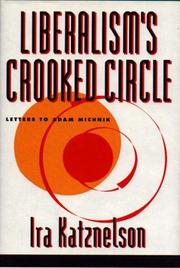
ISBN: 0691034389 0691004471 1282752367 140082186X 9786612752360 1400812283 9781400821860 9780691034386 661275236X 9781282752368 9781400812288 1400804337 1400816726 Year: 1998 Publisher: Princeton, NJ
Abstract | Keywords | Export | Availability | Bookmark
 Loading...
Loading...Choose an application
- Reference Manager
- EndNote
- RefWorks (Direct export to RefWorks)
This book is a profoundly moving and analytically incisive attempt to shift the terms of discussion in American politics. It speaks to the intellectual and political weaknesses within the liberal tradition that have put the United States at the mercy of libertarian, authoritarian populist, nakedly racist, and traditionalist elitist versions of the right-wing; and it seeks to identify resources that can move the left away from the stunned intellectual incoherence with which it has met the death of Bolshevism. In Ira Katznelson's view, Americans are squandering a tremendous ethical and political opportunity to redefine and reorient the liberal tradition. In an opening essay and two remarkable letters addressed to Adam Michnik, who is arguably East Europe's emblematic democratic intellectual, Katznelson seeks to recover this possibility. By examining issues that once occupied Michnik's fellow dissidents in the Warsaw group known as the Crooked Circle, Katznelson brings a fresh realism to old ideals and posits a liberalism that "stares hard" at cruelty, suffering, coercion, and tyrannical abuses of state power. Like the members of Michnik's club, he recognizes that the circumference of liberalism's circle never runs smooth and that tolerance requires extremely difficult judgments. Katznelson's first letter explores how the virtues of socialism, including its moral stand on social justice, can be related to liberalism while overcoming debilitating aspects of the socialist inheritance. The second asks whether liberalism can recognize, appreciate, and manage human difference. Situated in the lineage of efforts by Richard Hofstadter, C. Wright Mills, and Lionel Trilling to "thicken" liberalism, these letters also draw on personal experience in the radical politics of the 1960's and in the dissident culture of East and Central Europe in the years immediately preceding communism's demise. Liberalism's Crooked Circle could help foster a substantive debate in the American elections of 1996 and determine the contents of that desperately needed discussion.
Cultural pluralism. --- Liberalism. --- Post-communism. --- Socialism. --- Postcommunism --- Cultural diversity --- Diversity, Cultural --- Diversity, Religious --- Ethnic diversity --- Pluralism (Social sciences) --- Pluralism, Cultural --- Religious diversity --- Marxism --- Social democracy --- Socialist movements --- Liberal egalitarianism --- World politics --- Communism --- Culture --- Cultural fusion --- Ethnicity --- Multiculturalism --- Collectivism --- Anarchism --- Critical theory --- Liberty --- Political science --- Social sciences
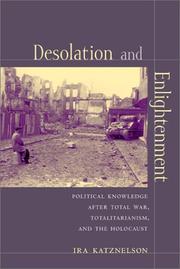
ISBN: 0231111940 0231507429 0231111959 9780231507424 9780231111959 9780231111942 Year: 2003 Publisher: New York Columbia University Press
Abstract | Keywords | Export | Availability | Bookmark
 Loading...
Loading...Choose an application
- Reference Manager
- EndNote
- RefWorks (Direct export to RefWorks)
During and especially after the Second World War, a group of leading scholars who had been perilously close to the war's devastation joined others fortunate enough to have been protected by distance in an effort to redefine and reinvigorate Western liberal ideals for a radically new age. Treating evil as an analytical category, they sought to discover the sources of twentieth-century horror and the potentialities of the modern state in the wake of western desolation. In the process, they devised strikingly new ways to understand politics, sociology and history that reverberate still. In this major intellectual history, Ira Katznelson examines the works of Hannah Arendt, Robert Dahl, Richard Hofstadter, Harold Lasswell, Charles Lindblom, Karl Polanyi, and David Truman, detailing their engagement with the larger project of reclaiming the West's moral bearing. In light of their epoch's calamities these intellectuals insisted that the tradition of Enlightenment thought required a new realism, a good deal of renovation, and much recommitment. This array of historians, political philosophers, and social scientists understood that a simple reassertion of liberal modernism had been made radically insufficient by the enormities and moral catastrophes of war, totalitarianism, and holocaust. Confronting their period's dashed hopes for reason and knowledge, they asked not just whether the Enlightenment should define modernity, but which Enlightenment we should wish to have. Decades later, in the midst of a new type of war and reanimated discussions of the concept of evil, we share no small stake in assessing their successes and limitations.
Holocaust, Jewish (1939-1945). --- Human behavior --- International relations --- Jews --- Political psychology. --- Political science --- Political sociology. --- Total war. --- War (Philosophy). --- World politics --- Philosophy. --- Public opinion --- History. --- Human behavior -- Philosophy. --- Coexistence (World politics) --- War (Philosophy) --- Holocaust, Jewish (1939-1945) --- Military policy --- Strategy --- War --- Hebrews --- Israelites --- Jewish people --- Jewry --- Judaic people --- Judaists --- Ethnology --- Religious adherents --- Semites --- Judaism --- Catastrophe, Jewish (1939-1945) --- Destruction of the Jews (1939-1945) --- Extermination, Jewish (1939-1945) --- Holocaust, Nazi --- Ḥurban (1939-1945) --- Ḥurbn (1939-1945) --- Jewish Catastrophe (1939-1945) --- Jewish Holocaust (1939-1945) --- Nazi Holocaust --- Nazi persecution of Jews --- Shoʾah (1939-1945) --- Genocide --- World War, 1939-1945 --- Kindertransports (Rescue operations) --- Peaceful coexistence --- Philosophy --- Mass political behavior --- Political behavior --- Sociology --- Politics, Practical --- Psychology, Political --- Psychology --- Social psychology --- Action, Human --- Behavior, Human --- Ethology --- Human action --- Human beings --- Human biology --- Physical anthropology --- Social sciences --- Psychology, Comparative --- Political philosophy --- Nazi persecution --- Persecutions --- Atrocities --- Jewish resistance --- Sociological aspects --- Psychological aspects --- Behavior --- Holocaust, Nazi (Jewish Holocaust) --- Nazi Holocaust (Jewish Holocaust) --- Nazi persecution (1939-1945)
Book
ISBN: 9780521728287 9780521899468 9780511790782 9780511424304 0511424302 9780511423314 0511423314 0511423829 9780511423826 0511790783 052189946X 0521728282 1107202396 1281775797 9786611775797 0511422652 0511421990 9781107202399 9781281775795 661177579X 9780511422652 9780511421990 Year: 2008 Publisher: Cambridge New York Cambridge University Press
Abstract | Keywords | Export | Availability | Bookmark
 Loading...
Loading...Choose an application
- Reference Manager
- EndNote
- RefWorks (Direct export to RefWorks)
The book examines the origins and development of the modern liberal tradition and explores the relationship between republicanism and liberalism between 1750 and 1830. The authors consider the diverse settings of Scotland, the American colonies, the new United States, and France and examine the writings of six leading thinkers of this period: Adam Smith, Adam Ferguson, James Madison, Thomas Paine, Germaine de Staël, and Benjamin Constant. The book traces the process by which these thinkers transformed and advanced the republican project, both from within and by introducing new elements from without. Without compromising civic principles or abandoning republican language, they came to see that unrevised, the republican tradition could not grapple successfully with the political problems of their time. By investing new meanings, arguments, and justifications into existing republican ideas and political forms, these innovators fashioned a doctrine for a modern republic, the core of which was surprisingly liberal.
Liberalism --- Republicanism --- Liberal egalitarianism --- Liberty --- Political science --- Social sciences --- History --- Political philosophy. Social philosophy --- Social Sciences --- Political Science
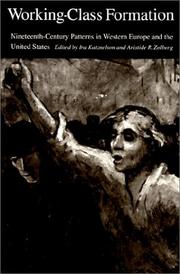
ISBN: 0691102074 0691054851 9780691054858 9780691102078 Year: 1986 Publisher: Princeton University
Abstract | Keywords | Export | Availability | Bookmark
 Loading...
Loading...Choose an application
- Reference Manager
- EndNote
- RefWorks (Direct export to RefWorks)
Book
ISBN: 9780521147347 9780521766548 9780511779510 9780511909788 0511909780 0511779518 0521766540 0521147344 0511850824 1107217555 1282818546 9786612818547 0511906986 051190827X 051190570X 0511909020 Year: 2010 Publisher: Cambridge New York Cambridge University Press
Abstract | Keywords | Export | Availability | Bookmark
 Loading...
Loading...Choose an application
- Reference Manager
- EndNote
- RefWorks (Direct export to RefWorks)
The theory of secularisation became a virtually unchallenged truth of twentieth-century social science. First sketched out by Enlightenment philosophers, then transformed into an irreversible global process by nineteenth-century thinkers, the theory was given substance by the precipitate drop in religious practice across Western Europe in the 1960s. However, the re-emergence of acute conflicts at the interface between religion and politics has confounded such assumptions. It is clear that these ideas must be rethought. Yet, as this distinguished, international team of scholars reveal, not everything contained in the idea of secularisation was false. Analyses of developments since 1500 reveal a wide spectrum of historical processes: partial secularisation in some spheres has been accompanied by sacralisation in others. Utilising new approaches derived from history, philosophy, politics and anthropology, the essays collected in Religion and the Political Imagination offer new ways of thinking about the urgency of religious issues in the contemporary world.
Religion and politics --- Secularization --- 27 "16" --- 291 --- 348.711.3 --- Appropriation and impropriation --- Impropriation --- Church and state --- 348.711.3 Scheiding Kerk en Staat. Secularisatie. Lekenstaat. Antikristelijke staat. Anticlericalisme --- Scheiding Kerk en Staat. Secularisatie. Lekenstaat. Antikristelijke staat. Anticlericalisme --- History --- Kerkgeschiedenis--17e eeuw. Periode 1600-1699 --- Godsdienstwetenschap: vergelijkend --- Law and legislation --- History. --- Arts and Humanities
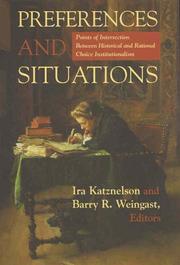
ISBN: 0871544415 Year: 2006 Publisher: New York (N.Y.) : Russell Sage Foundation,
Abstract | Keywords | Export | Availability | Bookmark
 Loading...
Loading...Choose an application
- Reference Manager
- EndNote
- RefWorks (Direct export to RefWorks)
Historical sociology. --- Institutions (Philosophy). --- Political sociology. --- Preferences (Philosophy). --- Rational choice theory --- Social institutions. --- Political aspects.
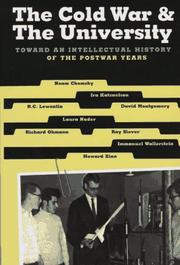
ISBN: 1565840054 Year: 1997 Publisher: New York (N.Y.) : New press,
Abstract | Keywords | Export | Availability | Bookmark
 Loading...
Loading...Choose an application
- Reference Manager
- EndNote
- RefWorks (Direct export to RefWorks)
Cold War. --- Education, Higher --- Political aspects --- History
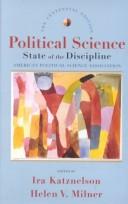
ISBN: 0393051420 Year: 2002 Publisher: New York (N.Y.) Norton
Abstract | Keywords | Export | Availability | Bookmark
 Loading...
Loading...Choose an application
- Reference Manager
- EndNote
- RefWorks (Direct export to RefWorks)
#SBIB:32H3 --- #SBIB:324H10 --- Politieke wetenschappen: inleidende werken, handboeken, methoden --- Politologie: algemene documentatie en bronnen --- #A0303PO --- Political science. --- State, The. --- Political science --- State, The --- Administration --- Commonwealth, The --- Sovereignty --- Civil government --- Government --- Political theory --- Political thought --- Politics --- Science, Political --- Social sciences
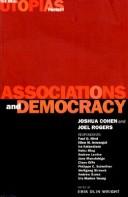

ISBN: 1859840485 1859849288 9781859849286 9781859840481 Year: 1995 Volume: 1 Publisher: London: Verso,
Abstract | Keywords | Export | Availability | Bookmark
 Loading...
Loading...Choose an application
- Reference Manager
- EndNote
- RefWorks (Direct export to RefWorks)
Democracy --- Voluntarism --- Associations, institutions, etc --- Congresses --- Associations, institutions, etc. --- Congresses. --- #SBIB:324H40 --- Politieke structuren: algemeen --- Voluntary action --- Volunteer work --- Volunteering --- Volunteerism --- National service --- Institutions, associations, etc. --- Networks (Associations, institutions, etc.) --- Organizations --- Voluntary associations --- Voluntary organizations --- Social groups --- Associations, institutions, etc. - Congresses. --- Voluntarism - Congresses. --- Democracy - Congresses --- Voluntarism - Congresses --- Associations, institutions, etc - Congresses
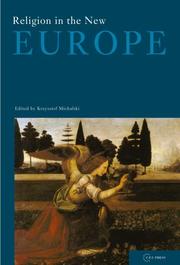

ISBN: 9786155053993 2821815042 6155053995 1281377082 9786611377083 1423769082 9781423769088 9637326472 9637326480 Year: 2022 Publisher: Budapest New York
Abstract | Keywords | Export | Availability | Bookmark
 Loading...
Loading...Choose an application
- Reference Manager
- EndNote
- RefWorks (Direct export to RefWorks)
The book addresses contemporary developments in European identity politics as part of a larger historical trajectory of a common European identity based on the idea of 'solidarity.' The authors explain the special sense in which Europeans perceive their obligations to their less fortunate compatriots, to the new East European members, and to the world at large. An understanding of this notion of 'solidarity' is critical to understanding the specific European commitment to social justice and equality. The specificity of this term helps to distinguish between what the Germans call "social state" from the Anglo-Saxon, and particularly American, political and social system focused on capitalism and economic liberalism. This collection is the result of the work of an extremely distinguished group of scholars and politicians, invited by the previous President of the European Union, Romano Prodi, to reflect on some of the most important subjects affecting the future of Europe.
European cooperation. --- European federation. --- Europe --- Religion. --- Federation of Europe --- Pan Europa movement --- Paneuropean federation --- United States of Europe (Proposed) --- Federal government --- Regionalism (International organization) --- International cooperation --- 21st century, Europe, European cooperation, Identity.
| Listing 1 - 10 of 11 | << page >> |
Sort by
|

 Search
Search Feedback
Feedback About UniCat
About UniCat  Help
Help News
News